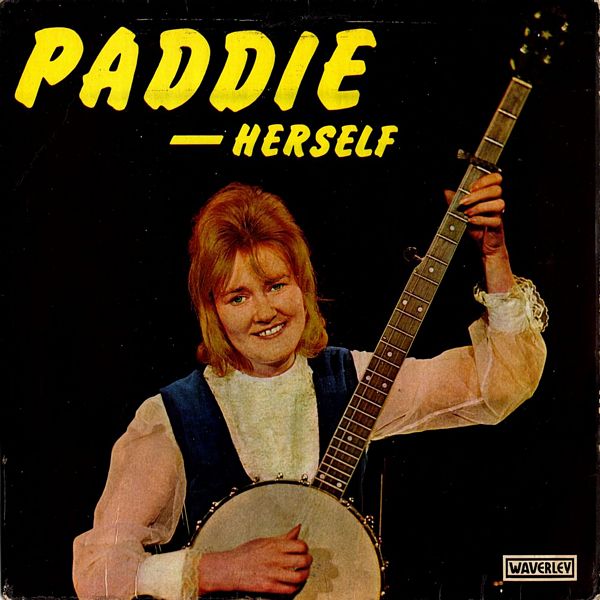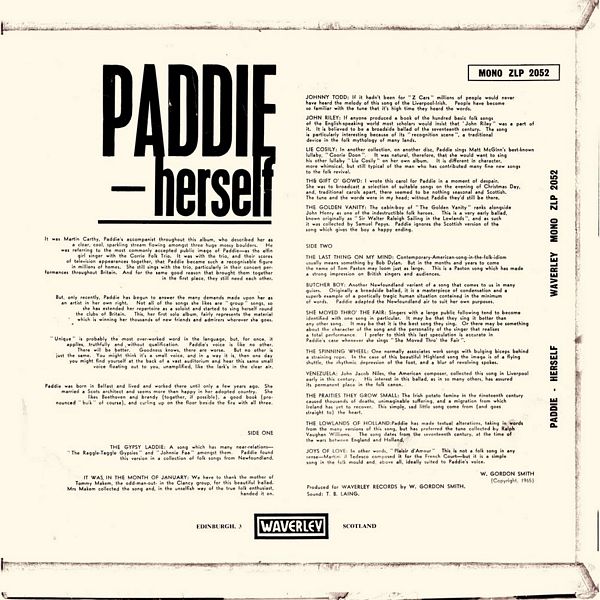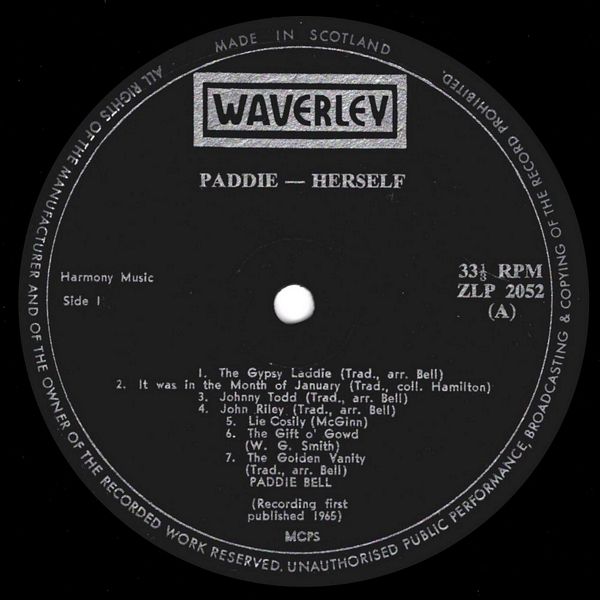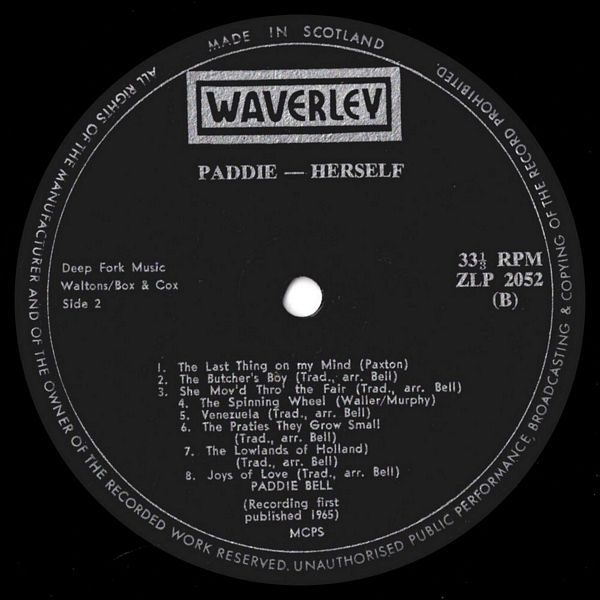
 |


 |
Sleeve Notes
It was Martin Carthy, Paddie's accompanist throughout this album, who described her as a clear, cool, sparkling stream flowing amongst three huge mossy boulders. He was referring to the most commonly accepted public image of Paddie — as the elfin girl singer with the Corrie Folk Trio. It was with the trio, and their scores of television appearances together, that Paddie became such a recognisable figure in millions of homes. She still sings with the trio, particularly in their concert performances throughout Britain. And for the same good reason that brought them together in the first place, they still need each other.
But, only recently, Paddie has begun to answer the many demands made upon her as an artist in her own right. Not all of the songs she likes are "group" songs, so she has extended her repertoire as a soloist and started to sing herself round the clubs of Britain. This, her first solo album, fairly represents the material which is winning her thousands of new friends and admirers wherever she goes.
"Unique" is probably the most over-worked word in the language, but, for once, it applies, truthfully and without qualification. Paddie's voice is like no other. There will be better.Goodness knows, there are worse. But no other is just the same. You might think it's a small voice, and in a way it is, then one day you might find yourself at the back of a vast auditorium and hear this same small voice floating out to you, unamplified, like the lark's in the clear air.
Paddie was born in Belfast and lived and worked there until only a few years ago. She married a Scots architect and seems more than happy in her adopted country. She likes Beethoven and brandy (together, if possible), a good book (pronounced "buik" of course), and curling up on the floor beside the fire with all three.
THE GYPSY LADDIE: A song which has many near-relations — "The Raggle-Taggle Gypsies" and "Johnnie Faa" amongst them. Paddie found this version in a collection of folk songs from Newfoundland.
IT WAS IN THE MONTH OF JANUARY: We have to thank the mother of Tommy Makem, the odd-man-out in the Clancy group, for this beautiful ballad. Mrs Makem collected the song and, in the unselfish way of the true folk enthusiast, handed it on.
JOHNNY TODD: If it hadn't been for "Z Cars" millions of people would never have heard the melody of this song of the Liverpool-Irish. People have become so familiar with the tune that it's high time they heard the words.
JOHN RILEY: If anyone produced a book of the hundred basic folk songs of the English-speaking world most scholars would insist that "John Riley" was a part of it. It is believed to be a broadside ballad of the seventeenth century. The song is particularly interesting because of its "recognition scene ", a traditional device in the folk mythology of many lands.
LIE COSILY: In another collection, on another disc, Paddie sings Matt McGinn's best-known lullaby, "Coorie Doon" It was natural, therefore, that she would want to sing his other lullaby "Lie Cosily" on her own album. It is different in character, more whimsical, but still typical of the man who has contributed many fine new songs to the folk revival.
THE GIFT O' GOWD: I wrote this carol for Paddie in a moment of despair. She was to broadcast a selection of suitable songs on the evening of Christmas Day, and, traditional carols apart, there seemed to be nothing seasonal and Scottish. The tune and the words were in my head; without Paddie they'd still be there.
THE GOLDEN VANITY: The cabin-boy of "The Golden Vanity" ranks alongside John Henry as one of the indestructible folk heroes. This a very early ballad, known originally as "Sir Walter Raleigh Sailing in the Lowlands ", and as such it was collected by Samuel Pepys. Paddie ignores the Scottish version of the song which gives the boy a happy ending.
THE LAST THING ON MY MIND: Contemporary-American-song-in-the-folk-idiom usually means something by Bob Dylan. But in the months and years to come the name of Tom Paxton may loom just as large. This a Paxton song which has made a strong impression on British singers and audiences.
BUTCHER BOY: Another Newfoundland variant of a song that comes to us in many guises. Originally a broadside ballad, it is a masterpiece of condensation and a superb example of a poetically tragic human situation contained in the minimum of words. Paddie adapted the Newfoundland air to suit her own purposes.
SHE MOVED THRO' THE FAIR: Singers with a large public following tend to become identified with one song in particular. It may be that they sing it better than any other song. It may be that it is the best song they sing. Or there may be something about the character of the song and the personality of the singer that realises a total performance. I prefer to think this last speculation is accurate in Paddie's case whenever she sings "She Moved Thro' the Fair".
THE SPINNING WHEEL: One normally associates work songs with bulging biceps behind a straining rope. In the case of this beautiful Highland song the image is of a flying shuttle, the rhythmic depression of the foot, and a blur of revolving spokes.
VENEZUELA: John Jacob Niles, the American composer, collected this song in Liverpool early in this century. His interest in this ballad, as in so many others, has assured its permanent place in the folk canon.
THE PRAITIES THEY GROW SMALL: The Irish potato famine in the nineteenth century caused thousands of deaths, unimaginable suffering, and a migration from which Ireland has yet to recover. This simple, sad little song come from (and goes straight to) the heart.
THE LOWLANDS OF HOLLAND: Paddie has made textual alterations, taking in words from the many versions of this song, but has preferred the tune collected by Ralph Vaughan Williams. The song dates from the seventeenth century, at the time of the wars between England and Holland.
JOYS OF LOVE: In other words, "Plaisir d'Amour" This not a folk song in any sense — Martini il Tedesco composed it for the French Court — but it is a simple song in the folk mould and, above all, ideally suited to Paddie's voice.
W. GORDON SMITH
(Copyright, 1965)